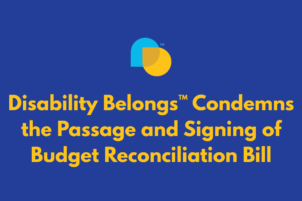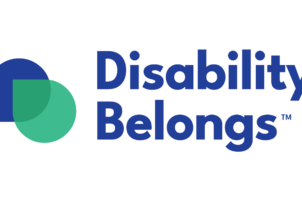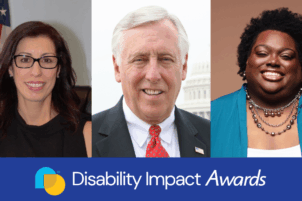Misunderstandings surrounding mental health can lead to harmful stereotypes, stigma, and exclusion. These barriers can make it harder for people with mental health disabilities* to be fully included, supported, and understood in their communities.
Mental health conditions are disabilities. They are valid and important parts of the disability experience. At Disability Belongs™, we’re committed to replacing myths with facts and building greater understanding. By recognizing mental health as a key part of disability inclusion, we can help create a more welcoming world for everyone.
Here are some common myths about mental health, and the facts you should know.
Myth: Mental health disabilities aren’t real disabilities.
Fact: Mental health disabilities are recognized as disabilities under the Americans with Disabilities Act (ADA) when they substantially limit one or more major life activities. Depression, anxiety, bipolar disorder, post-traumatic stress disorder (PTSD), schizophrenia, and others can all be legally and functionally considered disabilities. Mental health disabilities are just as important and deserving of support and accommodations as physical and other types of disabilities.
Myth: Only a small number of people experience serious mental health disabilities.
Fact: Mental health disabilities are extremely common. According to the National Institute of Mental Health, it is estimated that 1 in 5 U.S. adults live with a mental health disability—that’s more than 57 million people. More than 50% of people in the United States will be diagnosed with a mental health disability at some point in their lifetime (CDC).
Myth: A mental health disability is a sign of personal weakness.
Fact: Mental health disabilities have biological, psychological, and environmental causes. They are not signs of weakness. Like physical illnesses, they often require ongoing care, support, and treatment. Dismissing them as character flaws contributes to stigma and stops people from seeking help.
Myth: If someone just tried harder, they’d feel better.
Fact: Mental health conditions aren’t solved by willpower alone. While therapy, medication, rest, and connection can all play a role in healing, recovery isn’t linear and doesn’t look the same for everyone. Telling someone to “snap out of it” invalidates their experience and can worsen isolation.
Myth: It’s easy to tell when someone has a mental health condition.
Fact: Mental health is often invisible. Many people live with depression, anxiety, or other conditions without outward signs. Others may seem outwardly successful while silently struggling. Judging who is or isn’t disabled based on appearance or behavior is both inaccurate and harmful.
Myth: People with mental health conditions are dangerous.
Fact: Mental health conditions do not make someone dangerous. A 2009 study by researchers at the University of North Carolina at Chapel Hill concluded that people with mental illness alone are no more likely than anyone else to commit acts of violence.
Lead author of the study and assistant professor in the forensic psychiatry program in the UNC School of Medicine, Eric B. Elbogen, Ph.D., said, “We found that several other factors – such as a history of past violence or substance abuse or a recent divorce or loss of one’s job – are much more predictive of future violence than mental illness alone.”
People with mental health disabilities are more likely to be victims of violence than perpetrators. A 2005 study published in the Archives of General Psychiatry found that people with severe mental illness are 11 times more likely to be victims of violent crime compared to the general population. Additionally, a 2014 study from North Carolina State University reported that nearly one-third of adults with mental illness experience violence within a six-month period.
Myth: Accommodating mental health disabilities is too hard or disruptive in schools and workplaces.
Fact: Accommodations for mental health disabilities can be simple, effective, and mutually beneficial. For example, flexible scheduling, quiet workspaces, extended deadlines, and remote work options are inclusive practices that can benefit all employees and students—not just those with mental health conditions.
Myth: Talking about mental health makes things worse.
Fact: Silence fuels stigma. Honest conversations about mental health increase understanding, normalize asking for help, and save lives. Creating space for those living with mental health disabilities to share their experiences is key to building inclusive communities. A Gallup survey highlighted that 75% of U.S. adults want their primary care providers to address mental health during routine checkups.
Why This Matters
Misinformation about mental health causes real harm. It creates barriers to employment, education, healthcare, and social connection. It isolates individuals and can even lead to discriminatory treatment or violence.
Misrepresentation of mental health in the media exacerbates these issues. Negative, inaccurate portrayals (for example, depicting individuals with mental illness as violent or unpredictable) reinforce harmful stereotypes and deepen public misunderstanding. These portrayals can deter individuals from seeking help due to fear of judgment and perpetuate a cycle of stigma and exclusion.
Mental health is part of disability justice. It deserves the same visibility, respect, and legal protection as any other disability.
How You Can Help
- Share facts from credible sources—especially those led by people with lived experience.
- Speak up when you hear harmful stereotypes or jokes.
- Support policies that protect mental health rights in healthcare, the workplace, and beyond.
- Create and advocate for inclusive environments that make space for mental health needs.
- Understand that disability includes mental health—and treat all people with dignity, care, and respect.
Let’s push back against stigma, one fact at a time.
Combatting Misinformation is a five-part series from Disability Belongs™ to help correct harmful misinformation, narratives, and stereotypes around disability, neurodivergence, and mental health.
* Mental health disabilities may also be known as psychiatric disabilities, psychosocial disabilities, mental health conditions, and/or mental illness. People with lived experience may prefer to be called “mad” or “psychiatric survivors.” Not every person with a mental health disability identifies as part of the larger disability community or prefers the same language. We respect every individual’s choice when it comes to how they identify and the specific language they use to describe themselves. We use the term mental health disability to reinforce the social model of disability and the civil rights protections that apply to this community.








